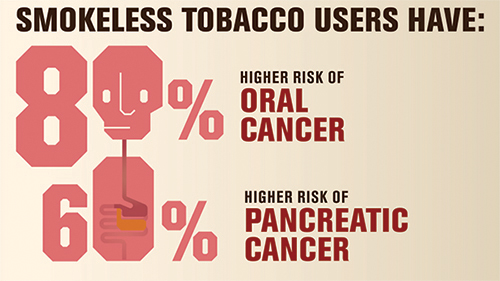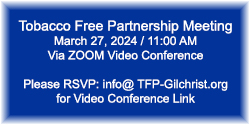News and Events
The Importance of Creating Tobacco-free Policies in 2020
By Tracy DeCubellis
March 11, 2020
It is no secret that tobacco use is harmful. Despite our knowledge of the multitude of cancer causing agents and toxins in tobacco, people still use it. One tobacco product that seems to get a free pass in rural areas is smokeless tobacco (dip/chew/snus). It seems that people have the opinion that it only harms the user and, since there is no smoke, using it in public or at youth functions is not as much of an issue as smoking or vaping might be.
It is important to correct that belief as it is untrue. Smokeless tobacco use can increase the risk of oral cancer by 80% and pancreatic cancer by 60%. According to the Centers for Disease Control, there are at least 28 cancer causing agents in smokeless tobacco. Since smokeless tobacco is actually “spit” tobacco, no one can really say it only impacts the user. It impacts the people around the user as well as the environment.

The tobacco industry is based on nicotine addicting the user. With the fall in the rate of cigarette smoking, Big Tobacco started creating products (in addition to e-cigarettes) that are flavored and easy for young people to consume or use without raising suspicion among adults. Some of these products are nicotine pouches which claim to be tobacco free, but they are still as addictive. Additionally, it is being reported that youth are getting access to items such as nicotine toothpicks which are nicotine products laced with addictive nicotine, but appear to be a functional object – a toothpick. Besides the health consequences of nicotine on the body, along with addiction to nicotine, one can imagine that these products pose a possible danger to young children who may mistake them for a similar product, such as just a simple toothpick. With Big Tobacco constantly coming up with new products like this, it is important for good policies to be in place to protect youth from harm and addiction.
The trend across the State of Florida is creating tobacco-free policies for recreational spaces, especially those that are youth-focused. In our area alone, there are many tobacco-free policies. Some of these tobacco-free events (including cigarettes, e-cigarettes or vaping, and smokeless) and venues in our area include:
- Otter Springs which has a tobacco-free policy except for designated areas,
- Dixie County has a tobacco-free parks rule to protect their children,
- Levy County Fair has a tobacco-free policy except for designated areas,
- The Gilchrist County Chamber of Commerce festivals, such as Christmas on Main are tobacco-free events
- The Cross City Fly-in and Business Expo has a tobacco-free policy
- Hart Springs has a smoke-free policy near the springs area by county proclamation
- Cedar Key Arts Festival has a tobacco-free policy except for designated areas
- Suwannee Arts Festival has a 100% tobacco-free policy
- Dixie Little League has a tobacco-free policy
- Gilchrist League/Suwannee Valley League has a tobacco-free policy
These are just a few events or venues around the tri-county area that already have declared tobacco-free zones, including the use of smokeless tobacco and e-cigarette products. This is important because young people are influenced by social pressure of friends using smokeless tobacco and can feel the need to comply with the tobacco use of a peer group.(1) In addition, young people who see adults using tobacco at public events such as youth sports leagues, youth fairs, or other events intended for youth recreation, can lead to a positive social norm about the use of tobacco. In other words, when kids see the responsible adults with a pack of cigarettes, a can of dip, or even using these products, it influences them to think this is what most adults do. In fact, it can even lead kids to greatly overestimate the number of adult tobacco users.(2) When youth think that most adults use tobacco products, it can lead to the belief that using tobacco can be a “rite of passage” into adulthood.
Each owner or manager of a community organization can take a step to improve the health of the community and influence young people to live healthy, tobacco-free lives through tobacco-free policies. For more information or for help in creating a tobacco-free policy, please contact Tracy DeCubellis at TracyD@QuitDoc.com or 352-463-7006.
_________________________________________________________________
(1) Holman, L.R., Bricker, J.B., & Comstock, B.A. (2013). Addiction, 108, 1327–1335.
(2) SOCIAL NORMS AND THE ACCEPTABILITY OF TOBACCO USE. (1994). In B.
Lynch & R. Bonnie (Eds.), Growing up Tobacco Free: Preventing Nicotine Addiction in Children and Youths. National Academies Press.




